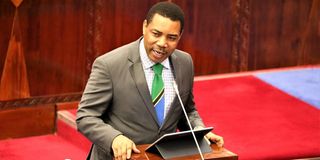Prime
Parliament passes new procurement law to enhance value for money

Minister for Finance Dr Mwigulu Nchemba
What you need to know:
- An MP urged the government to raise the threshold for international tenders on locally financed projects from Sh5 billion to Sh50 billion based on the value of the project
Dar es Salaam. The Parliament yesterday enacted a new Public Procurement Act as part of efforts to address bureaucratic encumbrances that arose with the implementation of the previous law passed in 2011.
Presenting the new Public Procurement Bill in Parliament in Dodoma yesterday, Finance Minister Dr Mwigulu Nchemba said one of the issues that the new law is going to address is to differentiate between procurement procedures of public institutions engaged in commercial activities and those that are not engaged in commercial activities.
“The aim of enacting the Public Procurement Act of 2023 is to establish better regulations for the management of public procurement, supply, and disposal of assets through tendering,” he said.
Dr Nchemba said other issues that the new law is set to address include the absence of price limit conditions for certain products and services in public procurement, a lack of defined project value limits, insufficient monitoring of work quality, and the need to regulate the professional standards and experience of project implementers, particularly in construction projects utilising the force account procedure.
“Cumbersome bid approval procedures have also contributed to inefficiencies in the procurement process,” stated Dr Nchemba.
He said the introduction of the Public Procurement Act 2023 is expected to improve the procurement and supply environment for both public institutions and government corporations. It seeks to create a more integrated supply chain. “The Act is set to strengthen contract management practices, ensuring that procurement projects are executed more efficiently and effectively and improving efficiency through electronic procurement,” he said.
He added that the Act will introduce price limit conditions for specific products and services in public procurement, helping to control costs and curb unnecessary expenditures. It will also improve the force account procedure and the monitoring of work quality.
Ultimately, the new Act will result in reduced bureaucracy, Dr Nchemba noted.
The Budget Committee Chairman, Mr Daniel Sillo, urged the government also start to initiate the process of preparing a public procurement policy and strategy.
The committee suggested that the presence of a specific policy and strategy will help reduce costs in public procurement and supply, address risks in procurement and supply, establish conditions for environmentally friendly procurement, and manage quality and the accessibility of service providers.
According to Mr Sillo, the government is to complete the implementation of the New National e-Procurement System of Tanzania. “Although the Bill proposes to specify a new section regarding contract management, there are still challenges in the preparation of balanced contracts (standard contracts). Therefore, the committee advises the government to have guidelines for the preparation of balanced contracts to avoid additional costs that may arise from contract changes,” said Sillo.
Mr Sillo, who is also the MP for Babati Rural (CCM) added that the committee recommended capacity-building for local contractors and suppliers by strengthening financial systems so that they can access funding for implementing projects in the country.
The Public Procurement Act of 2023 was enacted into law following debates among legislators.
The MPr for Buchosa Eric Shigongo said the new law should help Tanzanians compete in international tenders on projects that are implemented in Tanzania and fully financed by domestic resources.
“Every country has mechanisms to protect their entrepreneurs against competition in the international tendering process on projects in their own country,” Mr Shigongo noted.
He suggested that the international tender threshold be raised from the current Sh5 billion to Sh50 billion based on the value of the projects.





